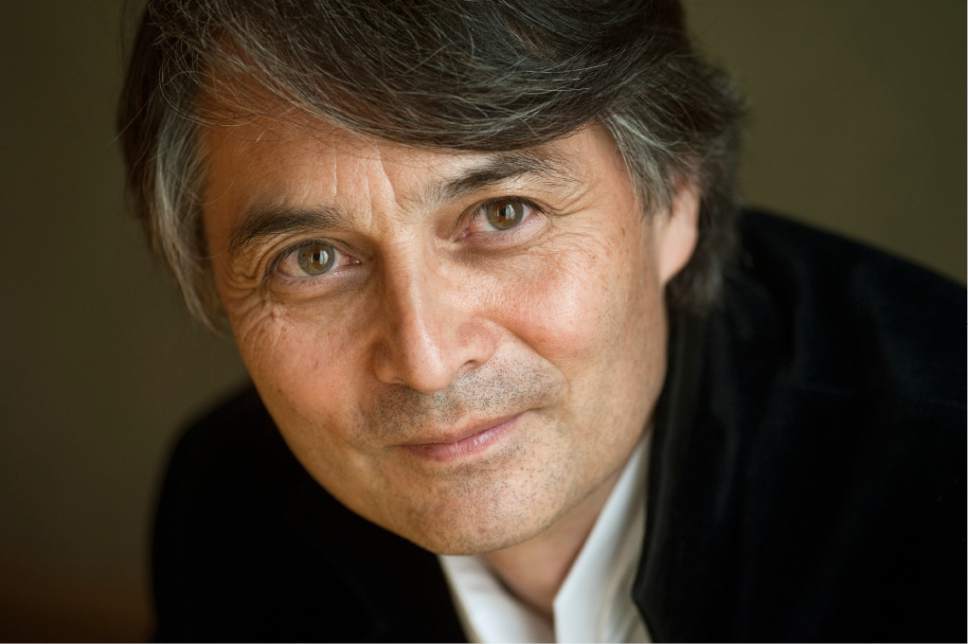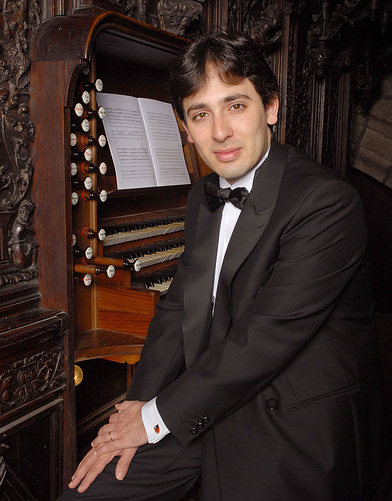Dallas Symphony scores with a night of organ music

Jun Märkl conducted the Dallas Symphony Orchestra Thursday night.
The Dallas Symphony Orchestra, with guest conductor Jun Märkl and guest organist Vincent Dubois, presented an intriguingly devised program Thursday evening at Meyerson Symphony Center.
Obviously, there was a strong “organ” theme to the evening, including Poulenc’s Organ Concerto and Saint-Saëns’ “Organ” Symphony No. 3, as part of the year-long celebration of the twenty-fifth anniversary of the 4,535-pipe Lay Family organ. Not so obviously, Messiaen’s L’Ascension provided a purely orchestral work heavily influenced by organ sonorities (and eventually retooled by the composer for organ solo) to likewise contribute to the concert’s organ focus.
Equally obviously, the program presented an all-French agenda—but one that leapfrogged the usually inevitable impressionist presence. Debussy and Ravel are, of course, near the center of the symphonic repertoire and very dear to the hearts of ticket-buyers, but this concert refreshingly reminded that there’s more to French music.
While the Saint-Saëns Organ Symphony represented the massive French romanticism that preceded impressionism, the works of Messiaen and Poulenc, composed at virtually the same moment as each other in the same city (Paris in the 1930s), might as well have been created in different universes. The wide array of styles and philosophies represented in these three works underlined the constant creativity and diversity of French music through the centuries, as well as many of the characteristics that distinguish it from the central European musical dynasty to the east.
A few minor blips in execution, some of which lay at the feet of conductor Märkl, interrupted the otherwise engaging flow of the evening. The first of these occurred in the ragged first chord of the brass in “Majesty of Christ demanding the glory of the Father,” the first of the four movements of L’Ascension; here, Märkl repeatedly failed to coax the smooth, precise entry from the brass necessary to “sell” this piece. The work initially progresses from the back of the orchestra to front, moving from brass to woodwinds to strings, and here the orchestra under Märkl admirably achieved the special sound-world Messiaen demands, particularly in the otherworldly string timbres. This performance, incidentally, marked the belated Dallas premiere of this pivotal work in 20th-century music, in which Messiaen opened new harmonic, structural, and philosophical avenues that continue to influence composers today.

Vincent Dubois
While L’Ascension announces a powerful new voice and style emphasizing Catholic mysticism and liberation from impetus-driven structure, Poulenc’s Organ Concerto in G minor finds a composer hitherto absorbed in humor and youthful joie-de-vivre suddenly facing darker elements of life. While one might question whether the mood swings and episodic nature of this concerto are entirely successful in terms of musical structure, the work absolutely reflects the troubled introspection of a human being confronted with harsh realities of death and aging. Thursday night, organist Dubois demonstrated complete technical command and emotional awareness, and, most impressively, an understanding of the colors and timbral possibilities of the Lay Family Organ. Likewise, he admirably paced his use of those possibilities—beginning with the jolting but carefully planned opening G minor blast—to move the listener irresistibly toward that final, triumphal G major chord that caps the work.
No one has ever accused Saint-Saëns of deep profundity; however, like much of the rest of his most well-known works, the “Organ” Symphony demonstrates an impressive command of musical structure, melodic creativity, and orchestral coloring. In short, while he offers no emotional apotheosis or grand statement of the human condition in this work, he gives us a perfectly constructed symphonic work that continues to hold up and please audiences 150 years after its premiere. Once again, organist Dubois demonstrated perfect insight into the subtleties and grandeur lurking within the Lay Family Organ–wisely rattling the eardrums only slightly at one key climactic moment.
For this listener, the high point arrived not in the loud thunder of the work but in the quiet first entry of the organ in the closing Adagio of the first movement; here, the breathtakingly subtle introduction of the organ was answered richly and smoothly by the Dallas Symphony strings in that suave, quintessentially Gallic melody. Conductor Märkl failed to correct the smudged tone in the busy passagework of the two Allegro sections, which slightly marred but by no means destroyed the otherwise compelling impetus of the work.
The program will be repeated 7:30 p.m. Friday and Saturday and 2:30 p.m. Sunday at Meyerson Symphony Center. mydso.com; 214-692-0203.